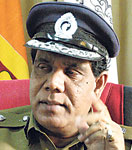Far from being centres of rehabilitation, prisons are where crimes are planned, new gangs formed and experiences shared. It comes as no surprise that Sri Lanka’s biggest ‘peace-time’ robbery was an outcome of a plan hatched inside the secure environs of the Welikada prison in Colombo.
 |
| DIG Daya Samaraweera |
Here six men, including four army deserters, remanded for drug-related offences, came up with a plan to carry out a robbery big enough to give them enough money to lead the rest of their lives in comfort and luxury. Ironically it was within these very same prison walls that detectives got their first clue which led to the arrest of the seven main suspects in the Rs. 70 million robbery three months ago.
Based on ongoing investigations by various police units, the Sunday Times was able to unravel the crime from the planning stage to the arrests of the suspects.
The crime
On the night of September 24, at Wanawasala in the Peliyagoda police area, armed with two T-56 automatic rifles and two grenades, the gang, comprising five of the six men who hatched the plan and a serving constable, waylaid a van carrying cash for ATM machines of the HSBC branches. At gunpoint, they ordered the occupants out of the van, tied their hands and forced them to sit in the rear of the same vehicle. Two of the suspects got in. One of them drove the van, while the other four followed it in three motorcycles. They stopped the van at a lonely spot and removed the bags of cash before they got away in the three motorcycles.
Their first stop after the robbery was the home of the main suspect, 31-year-old army deserter Ranga Chanaka Jayanath. He is said to be the mastermind behind the plot. He joined the army in 1998 and deserted in 2003. Since then he has been in and out of prisons for drug related crimes. He is being questioned by the Special Investigations Division of the Mirihana Police and it is based on his confession that the detectives are piecing together the details of the sensational robbery and the manner in which the crime was carried out.
Greed
If money is the root of every evil, greed is said to be the root cause of crime. In this case, it was the greed of another suspect, a deserter, known as Army Sampath that gave police the valuable clue.
According to the police, he was one of the original six who drew up the plan. But he was refused bail while the other five obtained bail and carried out the robbery.
“We had our first tip-off when a remand prisoner who shared the cell with Army Sampath overheard his phone conversation. The prisoner heard Army Sampath demanding his share of the loot, saying what was to be given to him was not enough,” Deputy Inspector General Daya Samaraweera told us.
The prisoner, believed to be police informant, then tipped off a CID detective. It was no difficult task for the detective to trace the number because Army Sampath had used his cellmate-turned-police informant’s phone.
The number which Army Sampath dialled was that of a Ganemulla "gym" run by another army deserter identified as Sanjeeva. A police party led by detectives of the Terrorism Investigation Division (TID) raided the gym and arrested Sanjeeva together with Chula, another suspect, who happened to be there.
The interrogations led to the arrests of army deserter Chamara and a second Sanjeeva.
Meanwhile, the main suspect, Chanaka learnt of the arrests and went into hiding. Police used one of the suspects in their custody as a decoy to lure him to an area and arrested him. A similar trap was laid for another suspect, a third Sanjeeva. Further interrogations saw TID detectives arresting the constable alleged to be involved in the robbery and a bank clerk from the HSBC Wattala branch.
Investigations reveal that the main suspect Chanaka and the constable who was serving at the Borella police at the time of the arrest were childhood friends. Hailing from a village in Ganemulla, they attended the same school.
“The bank clerk who also lives in the same village, had given the information regarding the route taken by the van and the number of people usually travelling in it. He had also told the robbers that the shotguns the security personnel in the van carried were not loaded,” DIG Samaraweera said.
Armed with the information given by the clerk, the other suspects carried out three dry runs during which they had followed the van without rousing the suspicion of its occupants.
They had then decided on a place to waylay the van. It was here the constable is alleged to have played his part of the robbery on September 24. Clad in his police uniform, he signalled the van to stop. Everything worked as planned with the rest of the armed gang overpowering the van’s occupants and carrying out the robbery with much ease and military precision.
Sharing the loot
The suspects have also revealed how they shared the loot at Chanaka’s house. The lion’s share went to Chanaka. He took Rs. 11.8 million from the Rs. 70 million robbed, and gave the other five suspects Rs. 5 million each (See chart for how the first suspect spent his money). Investigators believe that the bank clerk and Army Sampath were not allocated any share.
Chanaka wanted the rest of the money hidden in his house and in the house of a friend. Police have recovered a part of the loot. The weapons used in the crime were found in an abandoned well.
With the money they robbed, the suspects had visited casinos, travelled abroad, bought property and lent money on interest. Six of the men are being detained and questioned by the TID while Chanaka, the ring leader, is being held at the Mirihana Police.
DIG Samaraweera said they were looking for one more suspect. |



